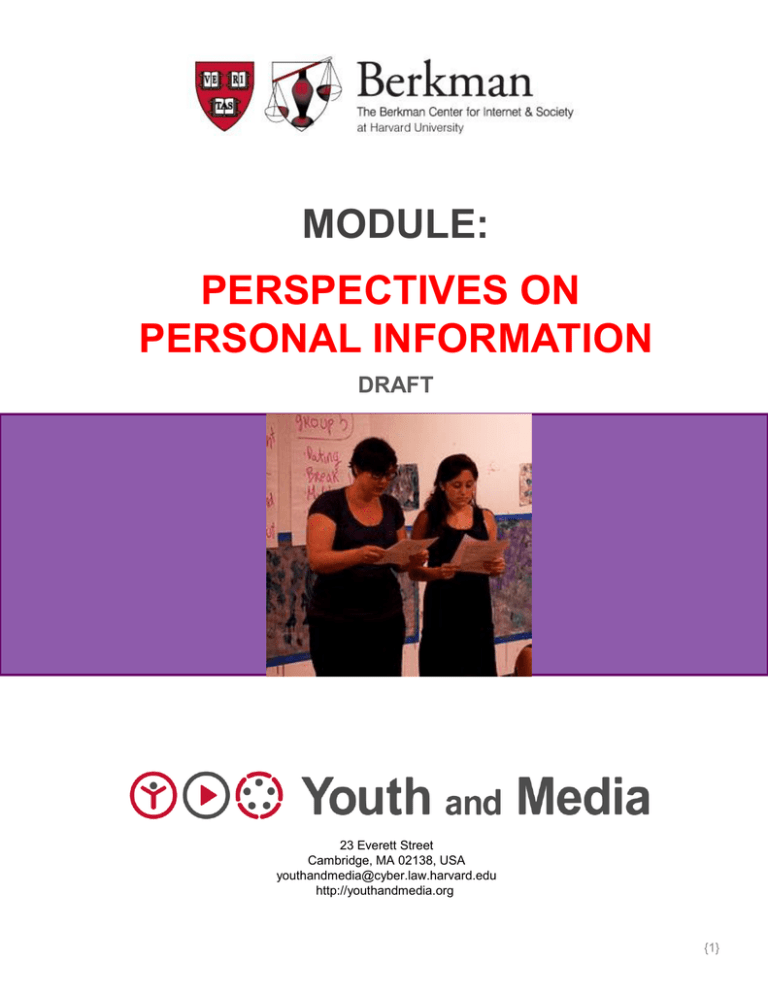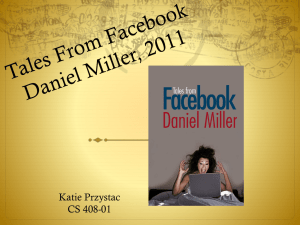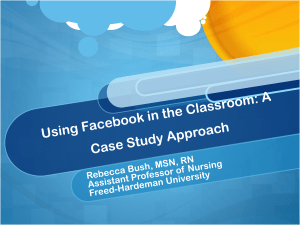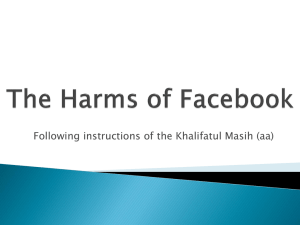Perspectives on Personal Information – PPT
advertisement

MODULE:
PERSPECTIVES ON
PERSONAL INFORMATION
DRAFT
23 Everett Street
Cambridge, MA 02138, USA
youthandmedia@cyber.law.harvard.edu
http://youthandmedia.org
{1}
Overview
This module demonstrates the role of perspective in shaping the evaluation process, particularly when
evaluating information linked to one’s online presence. Participants will also begin to consider the
implications of the information which they put online.
Objectives
Participants will be able to:
• Understand how perspective affects the evaluation process.
• Recognize that one leaves behind information through a prolonged online presence
Age/Grade
12-16 years old
Grades 7-10
Audience
Entry level and up (no experience necessary)
Duration
70 minutes
• What is Perspective? (10 minutes)
• Thinking Caps (40 minutes)
• Closure (20 minutes)
Materials
•
•
•
•
•
Handouts (Facebook profiles, 1 per group)
Computer/projector
Whiteboard/paper and markers
Printout of young/old woman illusion
Like/dislike buttons
What is Perspective?
(10 minutes)
Goal: To familiarize participants with the concept of perspective.
Materials: old woman/young woman illusion, computer, projector
[Project the illusion onto the whiteboard or a screen.]
[While asking questions, ask participants to come up and point out which
image they see, particularly relevant body parts.]
Say:
•
•
•
•
•
What do you see when you look at this picture?
How many of you see the young woman?
How many of you see the old woman?
Can you see both at once?
What you see can depend on your perspective. What do you think perspective is?
[Write down participant definitions on the board.]
[If no comprehensive definition is provided.]
Perspective is a particular attitude towards something; a point of view.
[Draw different smiley faces for each person on the board.]
Say: Here’s another example. Our friend Billy just made the school baseball team. When he tells
his mom, he says, “I made the baseball team!” His mother is very proud of him.
• When he tells his best friend, Jennifer, he says, “I made the baseball
team!” His best friend tells him she is very happy for him.
• However, he tells his friend Sam, who also tried out for the baseball
team, that he got the spot Sam wanted. So, Sam is not so happy.
• Billy is also a member of the science club, and now he has to miss
science meetings so he can go to baseball practice. When he tells
Katie, the president of the science club, she isn’t very happy either.
All of these different people in Billy’s life heard the same piece of information: Billy made the baseball
team. Why do they all react differently? Why do their different perspectives, and their different
relationships to Billy, matter?
Can you think of any other examples?
Why does perspective matter?
Thinking Caps
(40 minutes)
Goal: To explore the concept of different perspectives on the same piece of online personal
information; specifically, on a Facebook profile.
Materials: Kassra’s Facebook Profile Handouts, paper, pencils,
slips of paper with different “roles”
[Divide students into groups of 3-4. Give each group some paper and pencils.]
Say: I’m going to hand each group a screenshot of Kassra’s Facebook profile and a slip of paper. On
the slip of paper is the name of someone in Kassra’s life. As a group, we want you to imagine that you
are looking at this Facebook profile through the eyes of this person. Who do you think Kassra is? What
assumptions can you make? What does he like? What does he dislike? What has he commented on?
What are your perceptions of Kassra, based on your perspective? You will have ten minutes. Be
prepared to present at the end!
[Ask each group of students to present. (15 minutes)]
Potential Roles:
•
•
•
•
•
Kassra’s mom, who is concerned for her son’s safety
Kassra’s best friend, who looks up to him
A girl at a neighboring school, who doesn’t know Kassra.
Kassra’s teacher
A potential boss who is considering Kassra for a job
Discussion Questions: [15 minutes]
•
•
•
•
What were some of the differences in the ways that you perceived and evaluated Kassra?
Why do you think those differences exist?
Do you think that all of these evaluations are accurate? Why/why not?
Can you think of times when this has happened in your life – when the same information was
interpreted differently by different people?
• How many of you have had disagreements with your parents? Friends?
• How many of you use Facebook? Do you think about how your Facebook profile looks to
different people?
• Have you ever deleted something on your own Facebook profile? Why?
• Do you ever act differently around different people? Do you talk the same way you do to your
parents or teachers as you do to your friends? Why/why not?
Closure
(20 minutes)
Goal: To reflect on the meaning of perspective and why it is important to consider online .
Materials: None
Say: Today, we wanted to talk about Facebook profiles because we wanted to talk about the concept
of privacy, or the “digital breadcrumbs” you leave all over the internet.
• Do you present yourself differently on different websites? For example, on Facebook, you might use
your real name for everything, but do you use your real name for everything you do on the internet?
What are websites where you don’t always go by your real name? Do you ever use web
sites/services anonymously? Why?
• Do you present yourself differently online to different people?
• Do you think that the information you’ve shared online about yourself shows the whole picture of who
you are? Do you think your Facebook profile tells the whole story? Do you want it to?
• How will different people view your personal information online?
• What about if people only have access to some of your information? For example, can your parents
see everything you do on Facebook? Do your parents know you have a Twitter account? How many
of you keep your Tweets private? Why?
• Do you ever untag yourself in Facebook photos? Why?
• Have you ever searched for yourself online? Why?
• Do you think you can control all of the online information that’s about you?
• What can you control? (Examples: What you share online, and with whom)
• Are there things you can’t control? (When friends post pictures of you)
• What can you do about that?
• We talked a lot about perspective today. What does perspective mean to you?
• What was one thing you learned from today?
• What is another way that perspective affects how we evaluate information? Can you name a recent
current event where this was relevant? How is perspective important not just in our personal lives,
but on the news as well?








